Baris Kasikci
VoxServe: Streaming-Centric Serving System for Speech Language Models
Jan 30, 2026Abstract:Deploying modern Speech Language Models (SpeechLMs) in streaming settings requires systems that provide low latency, high throughput, and strong guarantees of streamability. Existing systems fall short of supporting diverse models flexibly and efficiently. We present VoxServe, a unified serving system for SpeechLMs that optimizes streaming performance. VoxServe introduces a model-execution abstraction that decouples model architecture from system-level optimizations, thereby enabling support for diverse SpeechLM architectures within a single framework. Building on this abstraction, VoxServe implements streaming-aware scheduling and an asynchronous inference pipeline to improve end-to-end efficiency. Evaluations across multiple modern SpeechLMs show that VoxServe achieves 10-20x higher throughput than existing implementations at comparable latency while maintaining high streaming viability. The code of VoxServe is available at https://github.com/vox-serve/vox-serve.
Magneton: Optimizing Energy Efficiency of ML Systems via Differential Energy Debugging
Dec 09, 2025Abstract:The training and deployment of machine learning (ML) models have become extremely energy-intensive. While existing optimization efforts focus primarily on hardware energy efficiency, a significant but overlooked source of inefficiency is software energy waste caused by poor software design. This often includes redundant or poorly designed operations that consume more energy without improving performance. These inefficiencies arise in widely used ML frameworks and applications, yet developers often lack the visibility and tools to detect and diagnose them. We propose differential energy debugging, a novel approach that leverages the observation that competing ML systems often implement similar functionality with vastly different energy consumption. Building on this insight, we design and implement Magneton, an energy profiler that compares energy consumption between similar ML systems at the operator level and automatically pinpoints code regions and configuration choices responsible for excessive energy use. Applied to 9 popular ML systems spanning LLM inference, general ML frameworks, and image generation, Magneton detects and diagnoses 16 known cases of software energy inefficiency and further discovers 8 previously unknown cases, 7 of which have been confirmed by developers.
Fake Runs, Real Fixes -- Analyzing xPU Performance Through Simulation
Mar 18, 2025Abstract:As models become larger, ML accelerators are a scarce resource whose performance must be continually optimized to improve efficiency. Existing performance analysis tools are coarse grained, and fail to capture model performance at the machine-code level. In addition, these tools often do not provide specific recommendations for optimizations. We present xPU-Shark, a fine-grained methodology for analyzing ML models at the machine-code level that provides actionable optimization suggestions. Our core insight is to use a hardware-level simulator, an artifact of the hardware design process that we can re-purpose for performance analysis. xPU-Shark captures traces from production deployments running on accelerators and replays them in a modified microarchitecture simulator to gain low-level insights into the model's performance. We implement xPU-Shark for our in-house accelerator and used it to analyze the performance of several of our production LLMs, revealing several previously-unknown microarchitecture inefficiencies. Leveraging these insights, we optimize a common communication collective by up to 15% and reduce token generation latency by up to 4.1%.
TeleRAG: Efficient Retrieval-Augmented Generation Inference with Lookahead Retrieval
Feb 28, 2025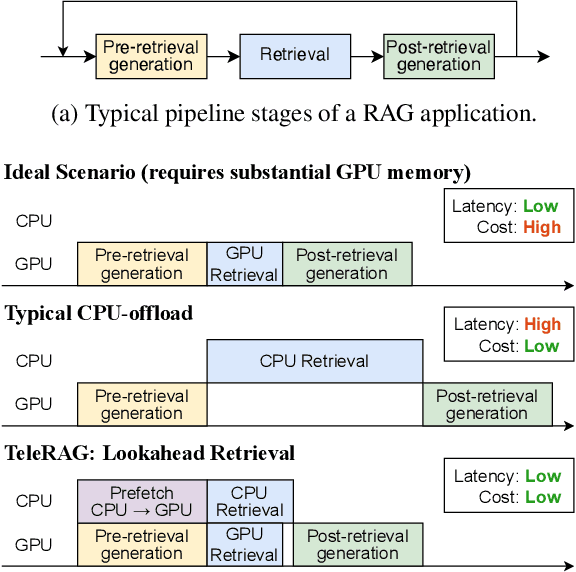



Abstract:Retrieval-augmented generation (RAG) extends large language models (LLMs) with external data sources to enhance factual correctness and domain coverage. Modern RAG pipelines rely on large datastores, leading to system challenges in latency-sensitive deployments, especially when limited GPU memory is available. To address these challenges, we propose TeleRAG, an efficient inference system that reduces RAG latency with minimal GPU memory requirements. The core innovation of TeleRAG is lookahead retrieval, a prefetching mechanism that anticipates required data and transfers it from CPU to GPU in parallel with LLM generation. By leveraging the modularity of RAG pipelines, the inverted file index (IVF) search algorithm and similarities between queries, TeleRAG optimally overlaps data movement and computation. Experimental results show that TeleRAG reduces end-to-end RAG inference latency by up to 1.72x on average compared to state-of-the-art systems, enabling faster, more memory-efficient deployments of advanced RAG applications.
LiteASR: Efficient Automatic Speech Recognition with Low-Rank Approximation
Feb 27, 2025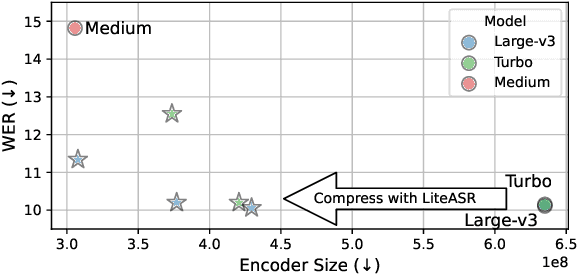
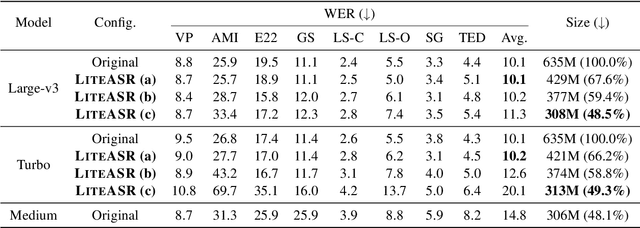
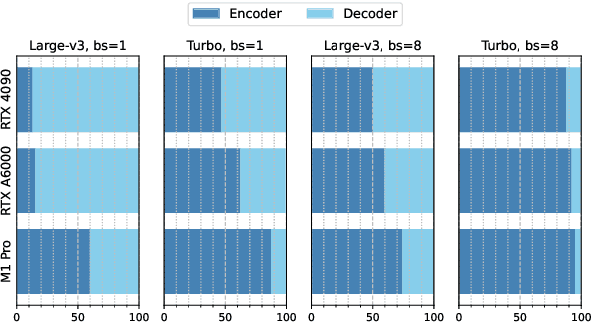
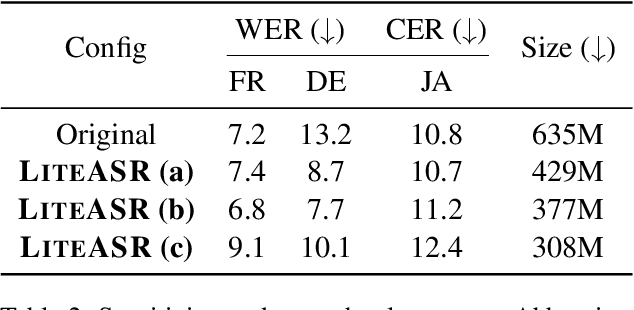
Abstract:Modern automatic speech recognition (ASR) models, such as OpenAI's Whisper, rely on deep encoder-decoder architectures, and their encoders are a critical bottleneck for efficient deployment due to high computational intensity. We introduce LiteASR, a low-rank compression scheme for ASR encoders that significantly reduces inference costs while maintaining transcription accuracy. Our approach leverages the strong low-rank properties observed in intermediate activations: by applying principal component analysis (PCA) with a small calibration dataset, we approximate linear transformations with a chain of low-rank matrix multiplications, and further optimize self-attention to work in the reduced dimension. Evaluation results show that our method can compress Whisper large-v3's encoder size by over 50%, matching Whisper medium's size with better transcription accuracy, thereby establishing a new Pareto-optimal frontier of efficiency and performance. The code of LiteASR is available at https://github.com/efeslab/LiteASR.
Tactic: Adaptive Sparse Attention with Clustering and Distribution Fitting for Long-Context LLMs
Feb 17, 2025Abstract:Long-context models are essential for many applications but face inefficiencies in loading large KV caches during decoding. Prior methods enforce fixed token budgets for sparse attention, assuming a set number of tokens can approximate full attention. However, these methods overlook variations in the importance of attention across heads, layers, and contexts. To address these limitations, we propose Tactic, a sparsity-adaptive and calibration-free sparse attention mechanism that dynamically selects tokens based on their cumulative attention scores rather than a fixed token budget. By setting a target fraction of total attention scores, Tactic ensures that token selection naturally adapts to variations in attention sparsity. To efficiently approximate this selection, Tactic leverages clustering-based sorting and distribution fitting, allowing it to accurately estimate token importance with minimal computational overhead. We show that Tactic outperforms existing sparse attention algorithms, achieving superior accuracy and up to 7.29x decode attention speedup. This improvement translates to an overall 1.58x end-to-end inference speedup, making Tactic a practical and effective solution for long-context LLM inference in accuracy-sensitive applications.
Argos: Agentic Time-Series Anomaly Detection with Autonomous Rule Generation via Large Language Models
Jan 24, 2025



Abstract:Observability in cloud infrastructure is critical for service providers, driving the widespread adoption of anomaly detection systems for monitoring metrics. However, existing systems often struggle to simultaneously achieve explainability, reproducibility, and autonomy, which are three indispensable properties for production use. We introduce Argos, an agentic system for detecting time-series anomalies in cloud infrastructure by leveraging large language models (LLMs). Argos proposes to use explainable and reproducible anomaly rules as intermediate representation and employs LLMs to autonomously generate such rules. The system will efficiently train error-free and accuracy-guaranteed anomaly rules through multiple collaborative agents and deploy the trained rules for low-cost online anomaly detection. Through evaluation results, we demonstrate that Argos outperforms state-of-the-art methods, increasing $F_1$ scores by up to $9.5\%$ and $28.3\%$ on public anomaly detection datasets and an internal dataset collected from Microsoft, respectively.
FlashInfer: Efficient and Customizable Attention Engine for LLM Inference Serving
Jan 02, 2025



Abstract:Transformers, driven by attention mechanisms, form the foundation of large language models (LLMs). As these models scale up, efficient GPU attention kernels become essential for high-throughput and low-latency inference. Diverse LLM applications demand flexible and high-performance attention solutions. We present FlashInfer: a customizable and efficient attention engine for LLM serving. FlashInfer tackles KV-cache storage heterogeneity using block-sparse format and composable formats to optimize memory access and reduce redundancy. It also offers a customizable attention template, enabling adaptation to various settings through Just-In-Time (JIT) compilation. Additionally, FlashInfer's load-balanced scheduling algorithm adjusts to dynamism of user requests while maintaining compatibility with CUDAGraph which requires static configuration. FlashInfer have been integrated into leading LLM serving frameworks like SGLang, vLLM and MLC-Engine. Comprehensive kernel-level and end-to-end evaluations demonstrate FlashInfer's ability to significantly boost kernel performance across diverse inference scenarios: compared to state-of-the-art LLM serving solutions, FlashInfer achieve 29-69% inter-token-latency reduction compared to compiler backends for LLM serving benchmark, 28-30% latency reduction for long-context inference, and 13-17% speedup for LLM serving with parallel generation.
BlendServe: Optimizing Offline Inference for Auto-regressive Large Models with Resource-aware Batching
Nov 25, 2024



Abstract:Offline batch inference, which leverages the flexibility of request batching to achieve higher throughput and lower costs, is becoming more popular for latency-insensitive applications. Meanwhile, recent progress in model capability and modality makes requests more diverse in compute and memory demands, creating unique opportunities for throughput improvement by resource overlapping. However, a request schedule that maximizes resource overlapping can conflict with the schedule that maximizes prefix sharing, a widely-used performance optimization, causing sub-optimal inference throughput. We present BlendServe, a system that maximizes resource utilization of offline batch inference by combining the benefits of resource overlapping and prefix sharing using a resource-aware prefix tree. BlendServe exploits the relaxed latency requirements in offline batch inference to reorder and overlap requests with varied resource demands while ensuring high prefix sharing. We evaluate BlendServe on a variety of synthetic multi-modal workloads and show that it provides up to $1.44\times$ throughput boost compared to widely-used industry standards, vLLM and SGLang.
Quest: Query-Aware Sparsity for Efficient Long-Context LLM Inference
Jun 16, 2024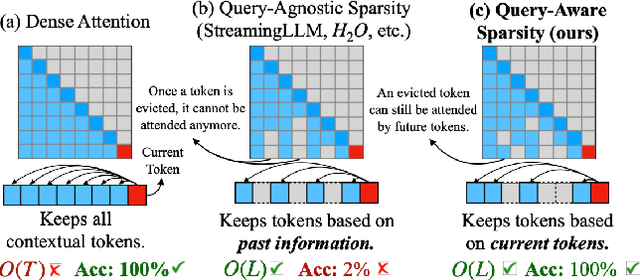
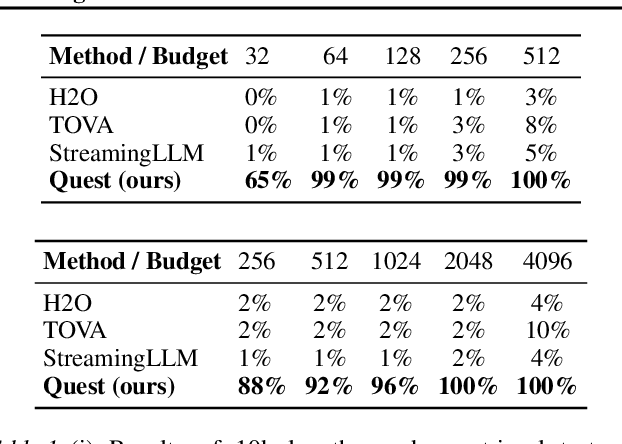
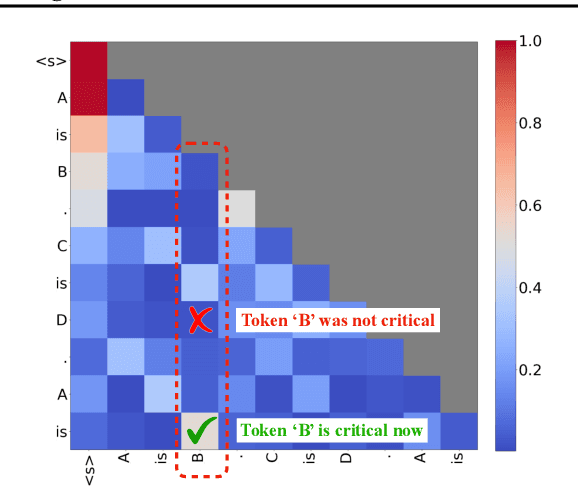
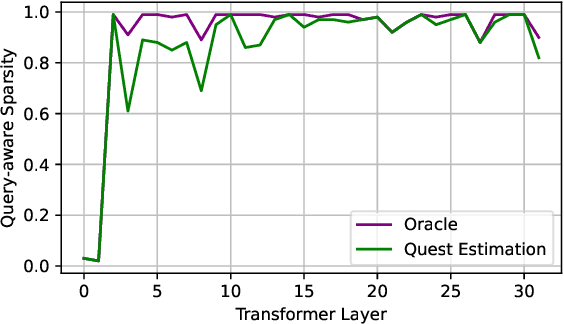
Abstract:As the demand for long-context large language models (LLMs) increases, models with context windows of up to 128K or 1M tokens are becoming increasingly prevalent. However, long-context LLM inference is challenging since the inference speed decreases significantly as the sequence length grows. This slowdown is primarily caused by loading a large KV cache during self-attention. Previous works have shown that a small portion of critical tokens will dominate the attention outcomes. However, we observe the criticality of a token highly depends on the query. To this end, we propose Quest, a query-aware KV cache selection algorithm. Quest keeps track of the minimal and maximal Key values in KV cache pages and estimates the criticality of a given page using Query vectors. By only loading the Top-K critical KV cache pages for attention, Quest significantly speeds up self-attention without sacrificing accuracy. We show that Quest can achieve up to 2.23x self-attention speedup, which reduces inference latency by 7.03x while performing well on tasks with long dependencies with negligible accuracy loss. Code is available at http://github.com/mit-han-lab/Quest .
 Add to Chrome
Add to Chrome Add to Firefox
Add to Firefox Add to Edge
Add to Edge